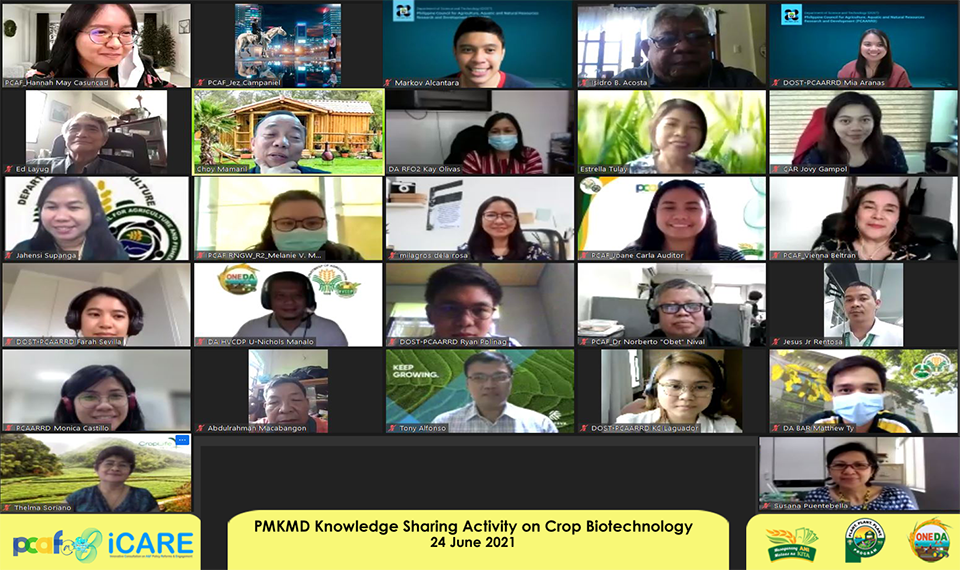
The Philippine Council for Agriculture and Fisheries (PCAF) conducted a virtual knowledge-sharing activity on June 24, 2021 to understand the prevailing and emerging crop biotechnology policy environment in the Philippines and draw insight into its implications on the food industry and agriculture development in the climate change era.
The study was conducted by the Philippine Council for Agriculture, Aquatic, and Natural Resources Research and Development (PCAARRD) and commissioned by PCAF.
The study titled “A Review of Policies on Crop Biotechnology: Impacts on Food Security and Agriculture Development in the Climate Change Era” was funded under the US PL480 “Strengthening the Rice Biotechnology Center”, a PhilRice project.
The study aims to explore the policy issues limiting crop biotechnology developments in the country and revealed that while the Philippines is the first country to have a regulatory framework on genetically modified and engineered crops, the current regulations are no longer facilitative and supportive of the development in the same field.
Dr. Ernesto Brown, the team leader of the research team, shared the results of the study. The Philippines as a biotech mega-country leads in terms of area planted to Genetically Modified (GM) crops and that it has a sound science-based regulatory biosafety policy. However, it might be overtaken soon by other countries as we were stalled in making progress due to policy constraints.
The study revealed too that the group of farmers that were oriented with the science behind GM is more willing to plant them rather than the group that was just given the seeds without proper briefing.
“Information dissemination is an important factor in the success of GM technologies and fully harnesses its potential in contributing towards the attainment of food security and agriculture development,” Dr. Brown said.
It was emphasized in the activity that GM technologies has potential towards the attainment of food security amidst climate change as it improves productivity, profit, and provides consistent farm performance due to its biotic resistance and abiotic tolerance.
On the other hand, it was discussed that there is a need to strengthen the value proposition for GM technologies and through continuous improvement/innovations.
The study proposes policy recommendations for action and advocacy, specifically to pursue changes to the current regulatory framework and to institutionalize the National Committee on Biosafety in the Philippines as a regulatory body with the budget needs as an institution. We also support the establishment of a Biotechnology Authority of the Philippines that will act as a research and development institute that will lead in research, technology promotion, and commercialization activities for crop biotechnology products.
Passing new legislations relative to biotechnology will help in the development of the agriculture sector. Representatives of legislators give their commitment in collaborating to advocate the development of biotechnology in the country
It was suggested for PCAF to hold similar activity and coordinate with the lower and upper congress and stakeholders to tackle and address the myriad of interconnected issues in the sector.
The two-session activity was attended by PCAF employees, Regional Non-government Workers, Regional Executive Directors, Regional Agricultural and Fishery Council Chairpersons, National Banner Program Committees, Regional Coordinators, and representatives from the legislative branch concerned with science and agriculture. | CCB











